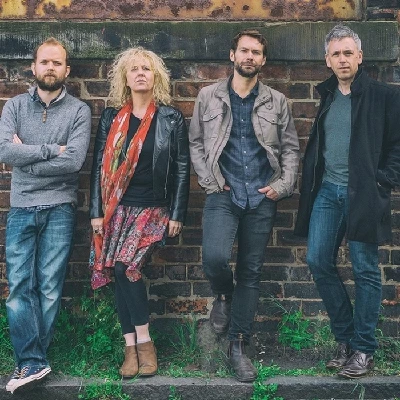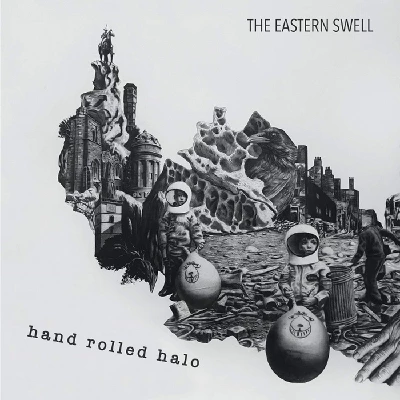published: 4 /
2 /
2019

Chris Reeve, the main songwriter, lyricist and guitarist with Edinburgh-based group the Eastern Swell, speaks to John Clarkson about his group's second album 'Hand Rolled Halo', which combines elements of folk, jazz, 60’s psychedelia and prog rock.
Article
“You suggest things and I will tell you if we were listening to it,” says Chris Reeve, the main songwriter, lyricist and guitarist with the Eastern Swell.
It is a freezing cold Sunday afternoon in early January in Edinburgh, and Reeve has met with Pennyblackmusic to talk about the Eastern Swell’s second album. ‘Hand Rolled Halo’.
The Eastern Swell, which consists of Lainie Urquhart (vocals, tambourine), s Reeve (guitar, vocals), Neil Collman (bass, vocals) and Andy Glover (drums and percussion), first formed in 2014 out of the ashes of another local Edinburgh outfit Lainie & The Crowes. They released their debut album, ‘One Day, A Flood’, in 2016, which like ‘Hand Rolled Halo’ has come out on Stereogram Recordings.
One can hear the influences of Pentangle, Fairport Convention and John Martyn on
‘Hand Rolled Halo’, but also as well early Pink Floyd, David Bowie’s ‘Black Star’ and the more psychedelic elements of the Beatles on it. Building on the Maths rock of its predecessor, but more under-stated and softer-focused than that album, it is a musically complex and stunning collusion of folk, jazz, 60’s psychedelia and prog rock.
An early highlight is ‘Blackwaterside’, a reworking of a traditional number which was also covered by Bert Jansch and Sandy Denny. While the original song tells of a girl duped by a man into sleeping with him but who finds him for all his promises gone by morning, the Eastern Swell give ‘Blackwaterside’ a new twist. They reprise it later in the album in an alternative version as ‘Down by the Blackwaterside’, in which the throaty-voiced Urquhart meets her man on her own terms and this time keeps him.
The penultimate song on the album ‘The Scene’ – and the last to feature Urquhart – is a slowly surging and ultimately triumphant six minute number about finding hope against the odds. There are two jazz rock instrumentals, ‘The Game’ and ‘Dreaming of St. Jude’. ‘Hand Rolled Halo’ also features guest appearances from the Eastern Swell’s regular producer Pete Harvey on keyboards and cello and trumpet-player al Hamilton.
As we battled with a tape recorder that had suddenly started to malfunction, Pennyblackmusic spoke to Chris Reeve about ‘Hand Rolled Halo’.
PB: On ‘One Day, A Flood’ the songs such as ‘Rattle the Bones’ and ‘Run Down Country Palace’ were instantly accessible. One has to search deeper for the songs on ‘Hand Rolled Halo’, but it grows with each new hearing and stands up to repeated listens. Was that what you were aiming for?
CR: Yes. After ‘One Day, A Flood’ the new songs started to come quite naturally. They took on a life of their own. I had put a lot of energy into ‘One Day, A Flood’ both creatively and with the band., but the songs I wrote after that had this relaxed late 60’s/early 70’s ‘Solid Air’/John Martyn jazz folk feel. I didn’t feel that they needed to push themselves to the front in the same way.
PB: How long did it take you from starting to write them to get into the studio?
CR: It wasn’t that long. About a year. We spent a lot of time getting the arrangements absolutely right in our rehearsal studio. Economics drove us to be as careful as possible with the time that we spent in the recording studio. We were in there for about eight days of recording time, and then there was mixing time on top of that.
PB: Your music is very complex. You must have been very tightly rehearsed before you went into the recording studio.
CR: I would have arrangements in mind and then we would all collectively work something out. Obviously things don’t always work out first time in the way that you think that they are going to, but surprisingly more often than not things fell immediately into place. When we were ready to start recording them, Andy, Neil and I rehearsed them in the way we knew that we were going to record them. We knew already where the vocals were going to be on top of that. We were very organised. We then brought in the other musicians, Pete Harvey on keyboards and cello and Al Hamilton on trumpet, at the end.
PB: One of the Eastern Swell’s main assets is your vocalist Lainie Urquhart. She appears on just six out of the eight tracks on ‘Hand Rolled Halo’, rather than all of them as she does on ‘One Day, A Flood’. Why did you decide to do that? Was it a case of less being more on this occasion?
CR: Yes. It just felt natural to do it that way. Writing the songs took on their own feeling and a form of their own. The instrumental songs didn’t need vocals. The songs didn’t call out for them. If we had put them on, they would have been very much an add-on. Lainie sings on all the tracks on ‘One Day, A Flood’ but we shared more of the vocals onm it, whereas, albeit it is only six tracks, she is very much the lead vocalist on ‘Hand Rolled Halo’.
PB: As the lyricist, do you find yourself having to adapt lyrics to suit her as a female?
CR: Very occasionally. If it is a song about love or relationships, I might angle it more towards a woman, but that is only very occasionally as a lot of the songs I am writing are about the past or based on memories. These are themes which are both male/female.
What I do have to think about more are vocal range differences and arranging them in the right key. Often when we are rehearsing we will realise something works better in Lainie’s vocal range if we move the key up. Changing the key to a song, however, changes the feel to it, but that is all part of the creative aspect.
PB: The main theme of ‘Hand Rolled Halo’ seems to be about standing up to life and all that it throws at you. Was that a conscious decision?
CR: It was more of a subconscious thing. I turned forty at the time I was writing ‘Hand Rolled Halo’. I realise now that I found myself l reflecting back and trying to piece together how I had got to where I was in life. Life always throws shit at you in some sense, and the album is about accepting things for what they and coming out the other end. It wasn’t deliberately crafted that way though. I didn’t set out to do a concept album, but I guess in part that is what it is.
PB: ‘Blackwaterside’ is a traditional folk number about a girl who is made a lot of promises by a man so that he can sleep with her, but by morning he is gone. Why did you decide to rework that number?
CR: ‘Blackwaterside’ has been sung by various people over the years. Bert Jansch recorded a version of it, and he sings that from a male perspective or at least that of a narrator telling the story. Sandy Denny did a version of it. I had heard both versions. I far preferred the Bert Jansch arrangement and the feel of that to the Sandy Denny one, but I put them both aside for a long time. I didn’t want them affecting my own interpretation of the song. I then rearranged the guitar part to it and I tweaked the lyrics because I thought the protagonist wasn’t strong enough for the 21st century.
PB: Was that why you decided to do a second version of it with ‘Down by the Blackwaterside’ and to give it an alternative ending?
CR: Yes, that’s right. I wanted to give it not so much as a more feminist but a more 21st century compliant version of relationships between men and women, and the original lyrics of ‘Blackwaterside’, in which she is left pining for the man even though he has tricked her, seemed to be totally off-kilter with gender equality.
I also thought it would be good to write a happier, more joyous version of ‘Blackwaterside’. There is something really beautiful about ‘Blackwaterside’ in its lyricism but the story is so dark that I just wanted to have a coda to it which is positive.
PB: ‘The Scene’, concludes on a note of triumph and hope with the lines “Climb the hill and I’ll meet you there/All the bells will chime for you and me.” What is that song about?
CR: That song starts about being young and in love. I wanted that last repeated line of “Climb the hill…” to be positive, but there to be an uncertainty and an instability in there as well. It is like “Climb the hill and I will meet you up there,” but you have got to get to that place first. “All the bells will chime for you and me,” but again you have got to get there and go through life’s trials first. There is the sound of the trumpet falling away at one point and that is why that is there to highlight that thought. Ultimately it reaches there with the guitar which has a fuzzed-up ending. It ends on a high note, but the point of that song and album is nothing achieved lightly.
PB: Pete Harvey again produced ‘Hand Rolled Halo’ as he did ‘One Day, A Flood’. He seems in some ways to be the unofficial fifth member of the band.
CR: Pete’s recording studio in Perthshire is very personable and as a place it is very relaxed. It is very easy to work with Pete. He is very chilled. He allows us our personal space, but he also puts his own stamp on it by playing the keys, the cello, whatever.
PB: Who is Al Hamilton?
CR: He is a good friend of mine from university. He studied Music at Edinburgh University. I didn’t know it until he arrived in the studio, but he was at university at the same time as Pete. They both studying Music and had toured together. He is a professional trumpet player and he has quite an intimate style, which is what I was looking for with this album.
PB: Thank you.
Band Links:-
http://www.theeasternswell.com/
https://en-gb.facebook.com/theeasterns
https://twitter.com/theeasternswell
Play in YouTube:-
Picture Gallery:-
